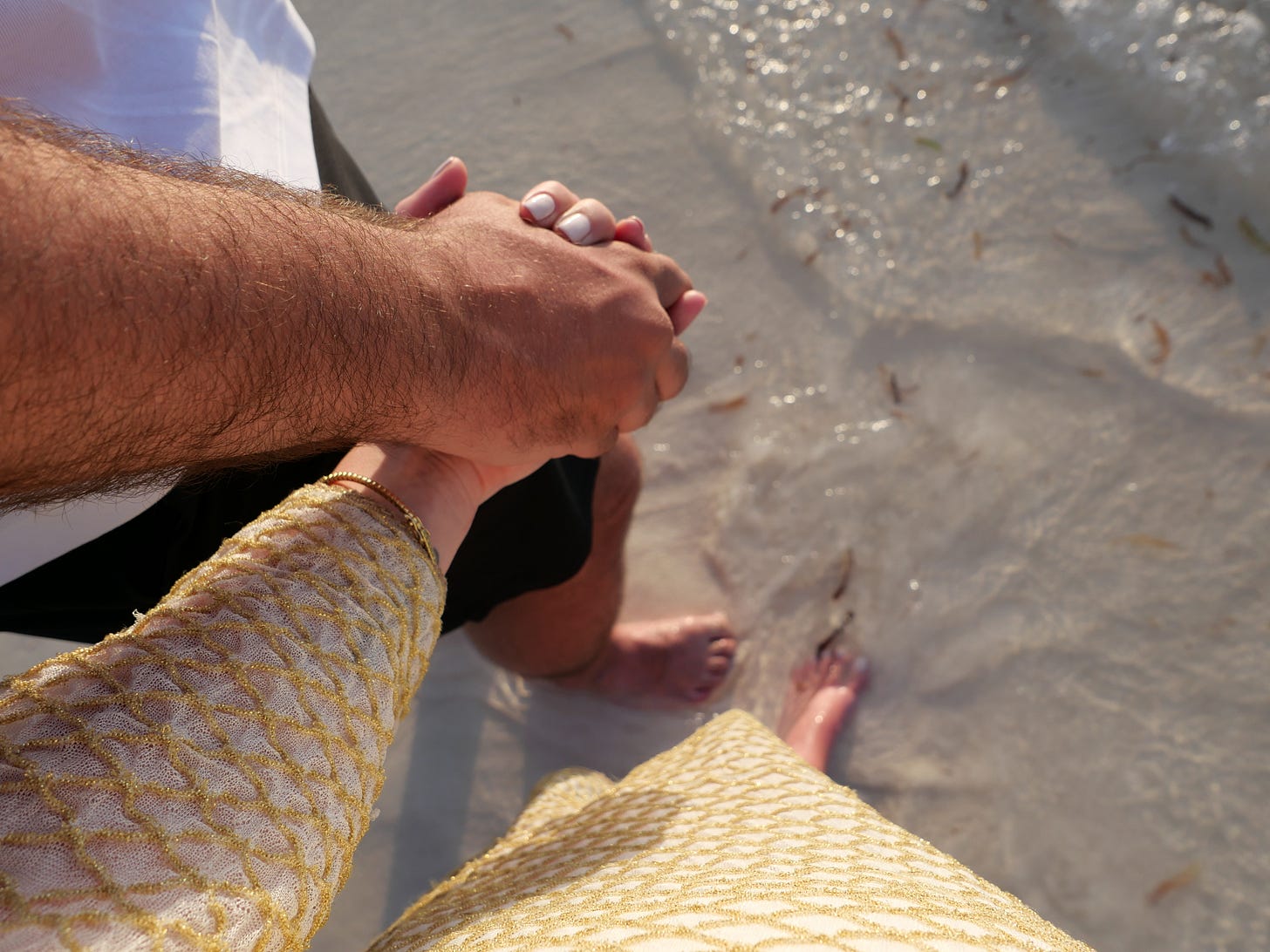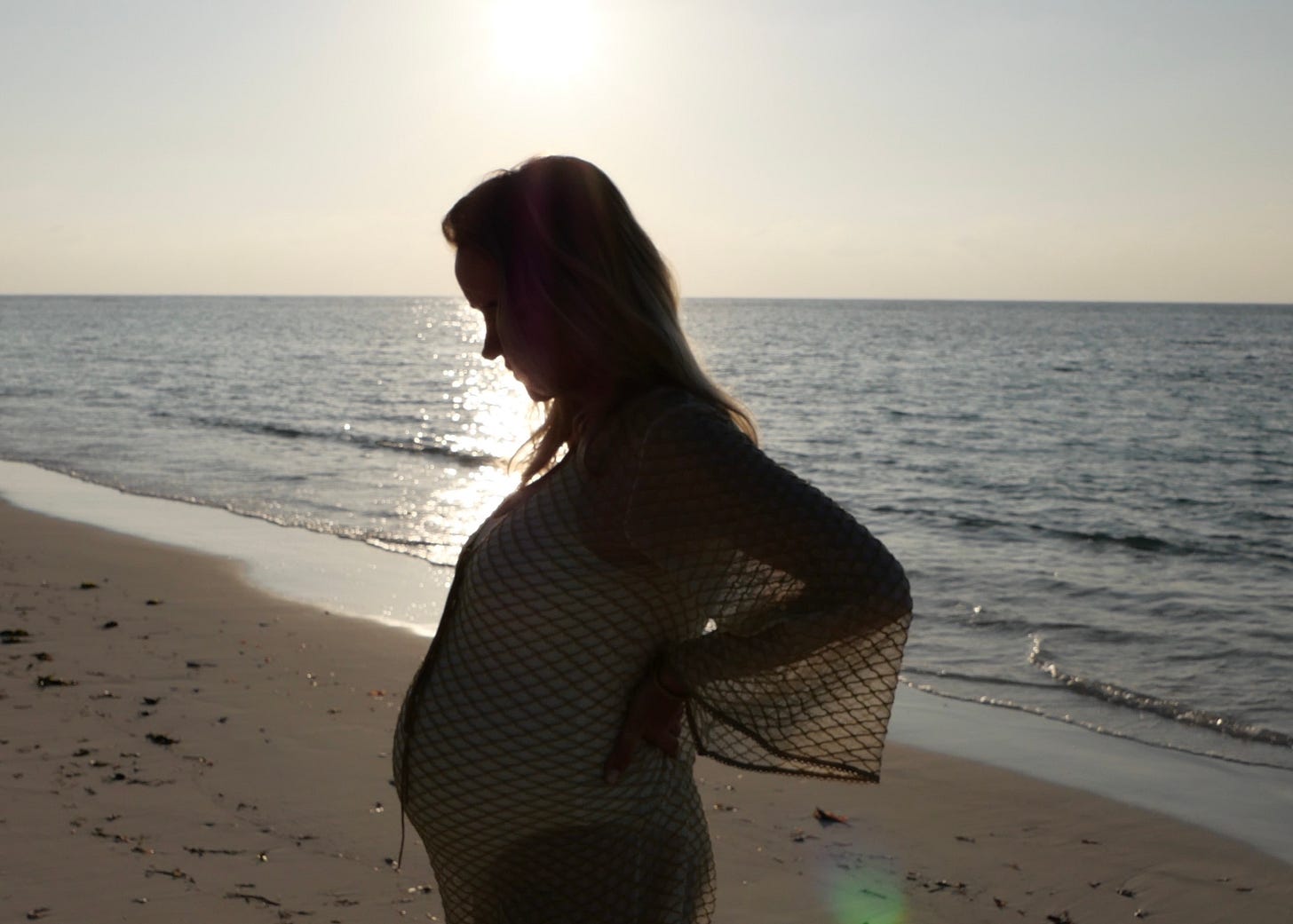I write this to you from the warm shores of Desroche Island in the Seychelles, where time is moving slowly and the sea has a way of softening everything: from thoughts to edges.
My husband has just gone off for a surfing lesson, optimistic and with absolutely no sunscreen on (despite my many reminders). I know that in a couple of hours, he’ll come back glowing in a deep tomato red shade, and I’ll spend the next few days lovingly tending to his sunburn with with aloe vera, aftersun lotion, and gentle scolding.
There is something about being here- just the two of us, before our world shifts forever that feels like pressing pause on everything else. A quiet chapter, full of laughter, afternoon swims, and whispered plans for the future. It’s dreamy.
And from this island bubble, I felt like writing to you.
There was a time when I thought love had to feel like a storm. That the intensity- the push and pull, the uncertainty, the highs and lows- was proof of passion, of commitment, of something worth fighting for. But what I know now, after a divorce and the slow unraveling of a toxic relationship, is that real love, the kind that lasts, does not leave your nervous system in overdrive. It does not demand that you shrink yourself to fit into someone else’s comfort zone. It does not feel like survival.
What no one tells you though… What you don’t realise until you’ve lived it- is that a healthy relationship is quiet in the best possible way. It’s not that there aren’t moments of excitement, but rather that the undercurrent of your life together is one of stability, not chaos. Your body isn’t bracing for impact. There is no constant waiting for the other shoe to drop. In a healthy marriage, in a love that is good for you, your nervous system is at rest. When I first experienced the kind of love that was steady, kind, and predictable in all the right ways, I questioned it. I thought: Where is the ache? It took unlearning everything I thought I knew about love to understand that security is not an ache or a pain… it is the most radical and intoxicating feeling of all. To be with someone who makes you feel safe, who does not keep you guessing, who meets you where you are instead of where they wish you’d be. That, my friends, is the real magic.
A healthy relationship is a homecoming. It is where you can exhale. It is not about grand gestures or proving your worth; it is about the deep, unshakable knowing that you are cherished exactly as you are. It is the warmth of a morning routine, the ease of shared silence, the absence of fear when you speak your mind. It is waking up every day with the quiet certainty that you are loved, not despite who you are, but because of it.
We are conditioned to believe that love should be hard, that suffering is part of the process, that real love requires endless compromise and self-sacrifice. Films, books, and even fairytales teach us that the most passionate love stories are filled with turmoil, that if it isn’t painful, it isn’t real. But the truth is, love should not be a battle. The idea that we must endure hardship to prove our devotion is a deeply damaging narrative that keeps people stuck in unhealthy cycles. Another myth we are fed is that jealousy is a sign of love- that if someone is possessive, it means they care. This belief normalises control and insecurity, making red flags look romantic rather than alarming. In reality, jealousy often stems from fear and unresolved personal wounds, not love. A healthy relationship is built on trust and respect, not on constantly having to prove loyalty or soothe someone’s fears.
We also romanticise the notion of "winning someone over," as if love is a competition or a prize to be earned. This creates a dynamic where one person is always chasing and the other withholding, reinforcing power imbalances that leave one partner feeling anxious and the other emotionally detached. True love is not about chasing- it’s about choosing each other every day, in a way that feels effortless and mutual.
Love affects the body in profound ways. When caught in a toxic relationship, the body experiences chronic stress, with cortisol levels spiking in response to constant uncertainty and emotional turmoil. This prolonged exposure to stress hormones can lead to anxiety, depression, and even physical symptoms such as headaches, fatigue, and digestive issues. Research has shown that the brain interprets rejection and relationship distress in the same way it processes physical pain, reinforcing how deeply our emotional well-being is connected to our physiological health. Quite sad, isn’t it?
On the other hand, a secure, loving relationship has the opposite effect on the body. When we feel emotionally safe with a partner, oxytocin, the “bonding hormone”- is released, promoting feelings of calm, trust, and connection. This neurochemical response lowers stress levels, reduces inflammation, and even improves heart health. According to the absolutely brilliant relationship therapist Esther Perel, "The quality of our relationships determines the quality of our lives. Secure attachment doesn’t mean a lack of excitement; it means a lack of fear."
Neuroscientists and psychologists alike emphasise the importance of nervous system regulation in relationships. Dr. Sue Johnson, the creator of Emotionally Focused Therapy (EFT), explains that love is a physiological experience: "We are wired for connection. When we feel securely attached, our nervous system calms, and we enter a state of rest and repair rather than stress and defense." This underscores why stable, nurturing relationships are not just emotionally fulfilling but are also crucial to overall health and longevity.
To anyone who has only known the kind of love that keeps you on edge, I promise you this: peace is not a compromise. Love should not feel like a fight to be chosen. The right person does not make your body feel like it’s always in a state of emergency. Real love is the calm after the storm, the place where you finally get to rest. And once you know what that feels like, you’ll never settle for anything less.






How did you pluck up the courage to leave that relationship? How long did you endure?